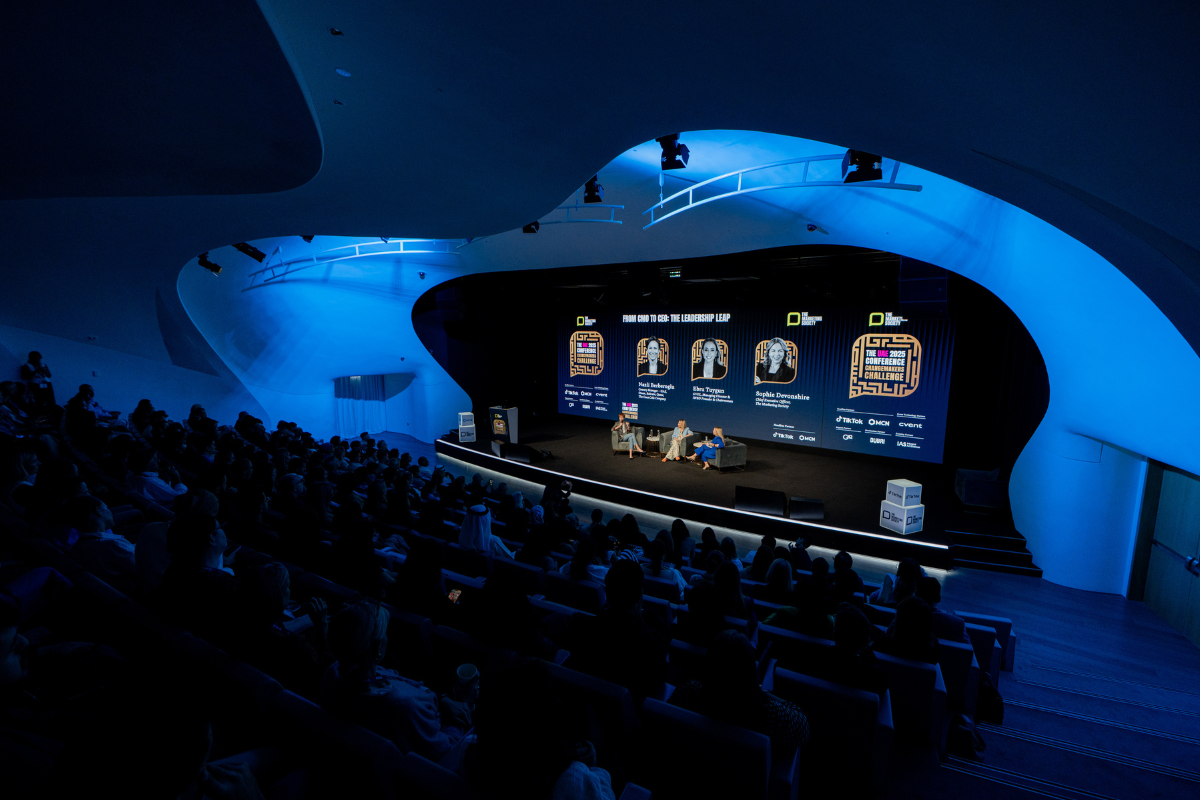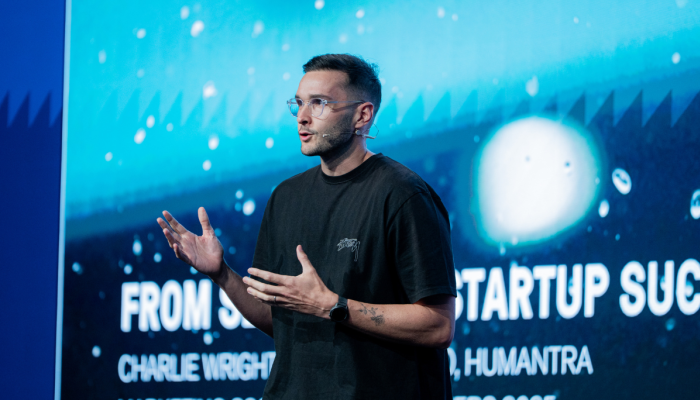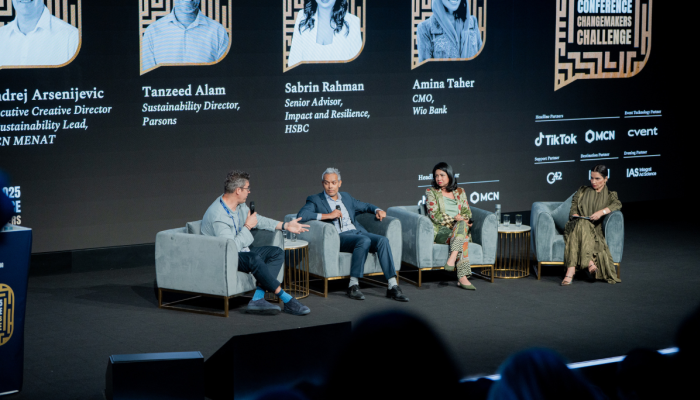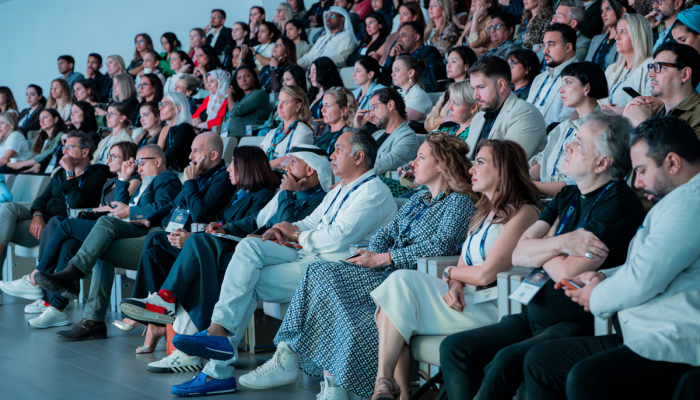`Marketing is at a turning point' neatly summed up the thread running through the 2025 Changemakers Conference which brought together leaders from across the region to address the biggest challenges facing brands today: leadership transitions, technology adoption, entrepreneurship, sustainability and the power of perception. Held at the Museum of the Future, the Conference delivered timely insights from CMOs turned CEOs, behavioural science experts, start-up founders and sustainability pioneers. This wasn't about theory; it was about what works.
5 Key Points from the Conference
Keep your marketing mindset when you become CEO
Nazli Berberoglu from Coca-Cola and Ebru Tuygun from GVGL made it clear: don't abandon your marketing thinking when you move into leadership. Your curiosity, strategic thinking and understanding of humans is your competitive edge. Too many marketers try to leave their marketing brain behind. That's the mistake. Marketing teaches you to think about perception, behaviour and what people really need. Those skills become more valuable, not less, at the CEO level.
Perception matters more than reality
Rory Sutherland delivered the standout insight of the day: the London Overground cost 1% of what the Elizabeth line cost but carries similar passenger numbers. How? It rebranded existing railway lines as tube lines and added them to the tube map. Usage quadrupled overnight. The infrastructure didn't change. The psychology did. Marketing creates value through pixels and ink, not just steel and concrete. The game isn't what things are. It's how people feel about them.
Adoption beats innovation
Annie Arsane from TikTok challenged the room to stop chasing the next big thing. Everyone talks about AI as the solution, but most organisations can't describe their AI capability as mature. The J-curve shows how technology adoption works: things get worse before they get better. More than 80% of businesses expect AI to deliver in one year, but they admit they're struggling to upskill employees. Competitive advantage comes from using existing tools better than your competitors, not waiting for the next innovation.
Never give up on yourself, even when you give up on ideas
Charlie Wright from Humantra shared the reality of entrepreneurship. He failed twice before Humantra. His first business cost him 45,000 euros on branding before proving the concept. He maxed out credit cards and hit the darkest point of his life. His second business taught him everything because he had no money to outsource. He learned 46 different skills. Humantra exists because Charlie refused to quit on himself. You can quit ideas. Just don't quit on yourself.
Transparency beats greenwashing every time
The sustainability panel made it brutally clear: greenwashing destroys brands. Volkswagen's diesel scandal is the textbook example. The UAE experienced floods made 40% more intense by climate change. Sustainability isn't a nice-to-have. It's a business imperative and a trillion-dollar opportunity. But only if you're transparent. Be honest about progress and setbacks. Authenticity wins. Sabrin Rahma from HSBC shared lessons from COP28: the best partnerships were between marketing and sustainability teams. Marketers help distill complex trade-offs into credible stories.
THE INSIGHTS
The Changemakers Conference opened with a simple premise: we're all facing rapid, challenging times. But the real test of leadership isn't what happens to us, it's how we choose to respond. Over the course of the day, speakers shared how they've navigated disruption, failure, growth and transformation.
The Museum of the Future
Abdulla Al Nuaimi, CMO of Dubai Future Foundation, kicked off the conference by sharing the story behind the Museum of the Future. Two weeks before opening, the team was still defining their identity. The pressure of a massive national milestone forced clarity. The lesson: deadlines bring focus; purpose matters more than perfection; marketing isn't just promotion it's giving shape to an idea that sits between innovation, optimism and human possibility.
From CMO to CEO
Nazli Berberoglu from Coca-Cola and Ebru Tuygun from GVGL sat down with Sophie Devonshire to discuss the leap from marketing to CEO. Nazli spent two-thirds of her career in marketing before moving into sales. It was uncomfortable, anxiety-inducing and exciting. That combination became her signal that growth was happening. When you feel too comfortable, find your next challenge.
Ebru left corporate life to start GVGL. She realised success was no longer about campaigns, it was about helping clients succeed. The mindset shift from delivering work to creating impact changed everything. Both leaders stressed the importance of community over networking. Real networks are built on shared energy, not LinkedIn connections. And mentorship matters; give back and keep seeking mentors yourself.
Adoption Over Innovation
Annie Arsane from TikTok introduced the J-curve: an economics concept showing how disruption works. When factories replaced steam engines with electric motors, productivity dropped before it soared. The same applies to AI today. Most organisations are in the dip, not the upswing. Expectations and reality are dangerously out of sync. More than 80% of businesses expect results in one year, but most struggle to describe their AI capability as mature.
Annie's message: stop chasing innovation and start mastering adoption. TikTok's Smart+ tools delivered a 78% increase in performance for brands that used them. Full-funnel visibility through Market Scope gives brands real-time insight into awareness, consideration and conversion. The tools exist, the question is whether you're skilled enough to use them.
The Humantra Journey
Charlie Wright shared the reality behind building Humantra. He failed twice before succeeding. His first business was a gaming platform. He spent 45,000 euros on branding before proving the concept. He threw money at problems to feel productive. The business failed. He maxed out credit cards and stopped seeing friends; it was the darkest point of his life.
His second business was a contact lens company. He had 60,000 dirhams and no budget for experts. He taught himself Facebook ads, email marketing, customer service and logistics. He worked 46 different roles. That constraint became his education. Covid hit and ecommerce boomed. Six months later, he got backing from a family office in Dubai and that became Humantra. Charlie's advice: entrepreneurship isn't glamorous, it's the hardest thing he's ever done but it's also the most rewarding.
The Repackaging Revolution
Rory Sutherland joined virtually to argue that marketing has failed to market itself. We define ourselves by what we do rather than how we think, that's why finance and operations don't respect us. His example: Yoplait created Frubes by putting yoghurt in a tube. Parents wanted to send yoghurt to school but couldn't because of spillage and missing spoons. Frubes solved both problems; same product, different container, entirely new market.
The London Overground rebranded existing railway lines as tube lines and added them to the tube map. Usage went up 400% on day one. The infrastructure didn't change, the psychology did. Hotels now charge extra for pool access rooms and gym access rooms. Those rooms always existed, by naming them, hotels turned proximity into a premium feature. Marketing creates value through perception, not just products.
Sustainability as Business Imperative
Andrej Arsenijevic from MCN, Tanzeed Alam from Parsons and Sabrin Rahma from HSBC discussed sustainability. Sabrin explained that sustainability has shifted from afterthought to commercial priority. There are trillions in opportunities through sustainable acquisitions, products and services. Companies that embrace sustainability as a growth driver will win.
Tanzeed brought it back to the UAE. The Dubai floods were made 40% more intense by climate change. Parsons is designing stormwater systems to prepare cities for extreme weather. These aren't theoretical risks, they're happening now. The panel stressed transparency; greenwashing destroys brands. Volkswagen's emissions scandal is the example. Be honest about progress and setbacks: authenticity wins.
Sabrin shared lessons from COP28. The marketing and communications team worked with policy leads to handle daily press conferences. They brought together policy experts, farmers and private sector representatives to tell credible stories. That partnership is what makes sustainability transformation believable.
3 Take-aways
from all this
Your marketing mindset is your competitive edge
Don't abandon it when you move into leadership. Curiosity, empathy and strategic thinking become more valuable, not less.
Master adoption before chasing innovation
Competitive advantage comes from using existing tools better than competitors. Invest in upskilling your team.
Perception creates value
Marketing isn't just about what you do. It's about how people feel. Change the psychology and you change the outcome.
2 Action Items
Audit your current tech stack
Identify tools you already have but aren't using to full potential. Focus on mastering those before chasing new ones.
Look for repackaging opportunities in your business
What already exists that could be reframed to create more value? Sometimes the biggest wins come from changing perception, not building something new.

"I truly believe that change really happens if you go out of your comfort zone, if you feel uncomfortable. So the combination of anxiety, a little bit of fear and also excitement, is the signal for me that change is happening and growth is coming."
Nazli Berberoglu Country Manager, Coca-Cola



